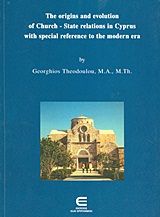
*Αποστολή σε 2-4 εργάσιμες μέρες
Τιμή Λεμόνι: 19,91 €
The Origins and Evolution of Church-State Relations in Cyprus With Special Reference to the Modern Era
Συγγραφή: · Γεώργιος Θεοδούλου
Έκδοση: Δεκέμβριος 2012 από "Επιφανίου Ηλίας"
Σελ.:188 (24χ17), Μαλακό εξώφυλλο, ISBN: 9963-674-58-5
Θέμα: "Εκκλησιαστική ιστορία - Κύπρος" "Πολιτική - Ιστορία - Κύπρος"
The subject of this book is a survey of the evolution of church-state relations in Cyprus from Antiquity, but with particular focus on the modern era, that is, the nineteenth and twentieth centuries. The objective is to provide a survey accounting for general and particular developments as well as highlighting various critical moments and issues.
After giving a sketch of the origins and early history of the Cyprus (lunch, I will concentrate on the emergence and development of the autocephalous Church of Cyprus from its origins in the fourth century. The historical autonomy of the Cyprus Church is very important to the history of the island because Orthodox Christianity managed to survive and thrive, in spite of so many invasions, due to the role played by the (lunch. The position of the ethnarchy (ethnarch= national leader) is central to the history of Cyprus. For the Archbishop of Cyprus as ethnarch was considered not only by the Greek Orthodox inhabitants of the island as their national leader, but also by the conquerors, especially by the Turks and the British.
I accordingly examine in detail the prerogatives and rights of the Archbishop of Cyprus granted during the Ottoman occupation (1571-1878) and also the acceptance of his leadership by the British administration (1878-1960). In the last two Chapters 1 stress that the role of the ethnarch, Archbishop Makarios III, leading up to the independence of Cyprus in 1960 is vital, as is evident during the negotiations with the British Government. It was he who signed, on behalf of the Greek population of Cyprus, the Zurich and London agreements by which the new State of Cyprus was established. It was also through his guidance and interventions that the new Cyprus constitution of 1960 was framed. This safeguarded the privileges of the Church, inherited from the time of the Ottoman Empire, and since Archbishop Makarios III was the Head of State from 1960-1977 nobody ever tried to dispute them.
Finally, I highlight and evaluate in this thesis the conflict arising from the two traditional roles of the ethnarch on the one hand, and his new civil office in independent Cyprus on the other. It suggests that the manoeuvring by the ethnarch, Makarios III, saw him use his authoritarian and charismatic nature to achieve power by exploiting his spiritual and national roles. The culmination of this was the confusion and instability that led to the deterioration of relations between Greece and Cyprus and the inevitable invasion of Cyprus by Turkey in 1974 after the coup.
(from the introduction)
(2011) Καταγωγή και εξέλιξη των σχέσεων εκκλησίας-πολιτείας στην Κύπρο, Επιφανίου Ηλίας

 Theodoulou, Georgios ¹
Theodoulou, Georgios ¹